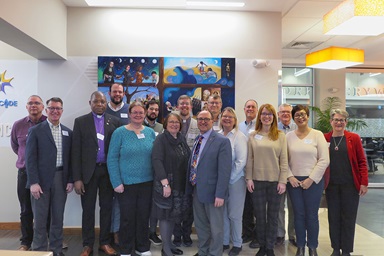The United Methodist Church’s top court has clarified a 2019 ruling related to the administrative process for clergy and the right of a clergy person to fair and due process.
In Memorandum 1408, issued March 22, the Judicial Council added specific language to four paragraphs in the 2016 Book of Discipline — the denomination’s law book — to ensure that those directly involved in certain administrative matters would not vote on recommendations brought to the clergy session of annual conference.
The particular administrative matters affected are involuntary leave of absence, involuntary retirement, administrative location and discontinuance from provisional membership.
Covering Disciplinary paragraphs 354, 357.3, 359 and 327.6, the ruling applies to members of an annual conference cabinet, board of ordained ministry, conference relations committee or administrative review committee who can’t vote on these matters at the clergy session “if they were involved in any prior discussions, communications, proceedings and/or decisions.”
The ruling is in response to a request from the United Methodist Council of Bishops, which voted last July to ask for a declaratory decision clarifying Decision 1383. The petition also requested a conditional stay of Decision 1383 “pending legislative action by General Conference.”
The Judicial Council is continuing to deliberate on a 19-item docket in its first virtual meeting since the coronavirus pandemic began. It took the unusual action of releasing one of its opinions prior to the completion of that docket, said the Rev. Kabamba Kiboko, Judicial Council secretary, because Memorandum 1408 bears directly on the question as to whether annual conferences may or should prepare legislation in response to Judicial Council Decision 1383, while also addressing the bishops’ inquiry.
"The members of the Judicial Council are aware that many annual conferences have quickly approaching deadlines for submission of proposed legislation for consideration by their 2021 annual conference sessions,” Kiboko said in a statement to UM News.
Issued on Nov. 1, 2019, Decision 1383 was in response to a request by the Western Pennsylvania Conference. In its ruling, the Judicial Council found that provisions “setting forth the administrative process” in those specific paragraphs of the Discipline violated the guarantees of “a fair and unbiased process” found in church law and were unconstitutional, null and void.
“The fundamental right to fair and due process of an accused clergy person is denied when individuals who were involved in referring, adjudicating, and reviewing an administrative complaint are also permitted to vote on the final disposition in the clergy session of an annual conference,” Decision 1383 said.
Since then, there has been no opportunity for General Conference, the denomination’s top legislative body, to amend the paragraphs deemed unconstitutional.
Because of the COVID-19 pandemic, the General Conference originally set for May 5-15, 2020, was postponed. Since then, General Conference has been rescheduled twice, first for Aug. 29-Sept. 7, 2021, and, more recently, for Aug. 29-Sept. 6, 2022. The meeting venue remains in Minneapolis.
Before Judicial Council issued a ruling on the matter, the Council of Bishops had announced a special one-day virtual General Conference, to take place May 8. The first of 12 pieces of legislation for that special session proposed an amendment to Paragraph 354 to comply with Decision 1383. However, the bishops made the decision to cancel the May 8 special session during a March 22 online meeting.
The top court’s memorandum addresses a question in the petition from the bishops about whether an annual conference can continue to employ the administrative process provisions of the paragraphs earlier declared unconstitutional by adopting specific language.
The clarification made in Memorandum 1408 “ensures that the administrative processes continue to remain in effect while bringing the issue of voice and vote into compliance with the fair process requirements of the Constitution,” the council wrote.
“As such, no specific annual conference action is necessary other than to ensure continued compliance with the Discipline, including the voting restrictions that are set forth herein.”
Bloom is assistant news editor emeritus for United Methodist News.
News media contact: [email protected]. To read more United Methodist news, subscribe to the free Daily or Weekly Digests.
Like what you're reading? Support the ministry of UM News! Your support ensures the latest denominational news, dynamic stories and informative articles will continue to connect our global community. Make a tax-deductible donation at ResourceUMC.org/GiveUMCom.




